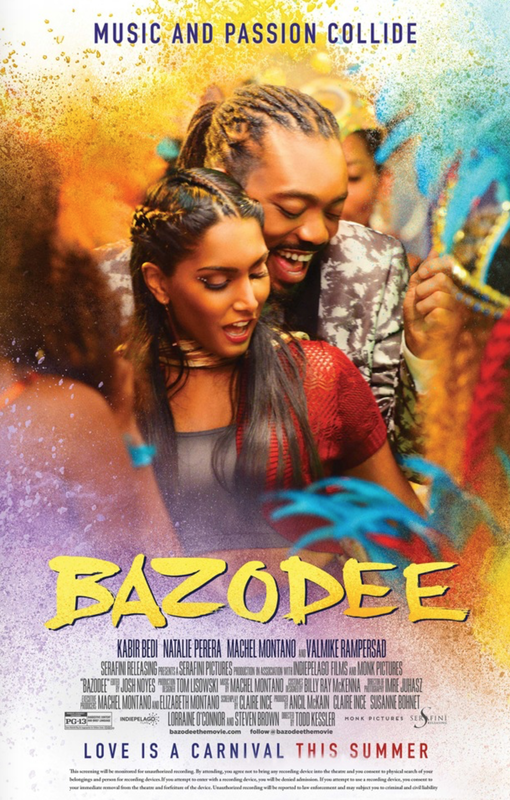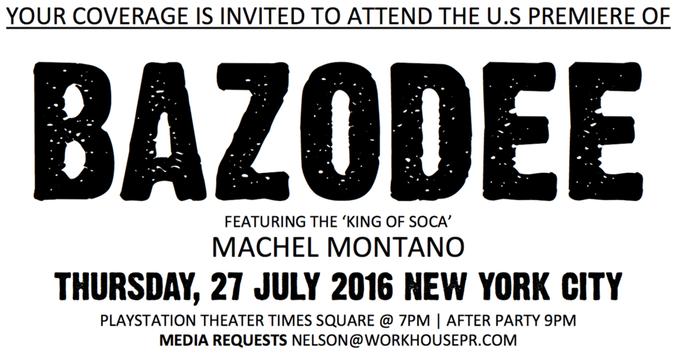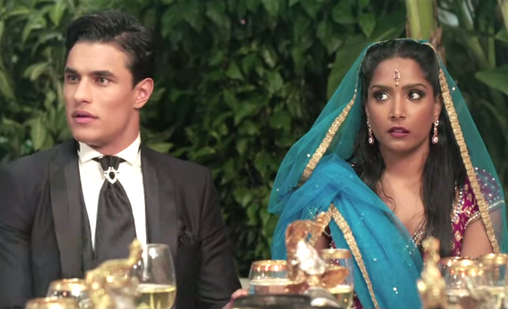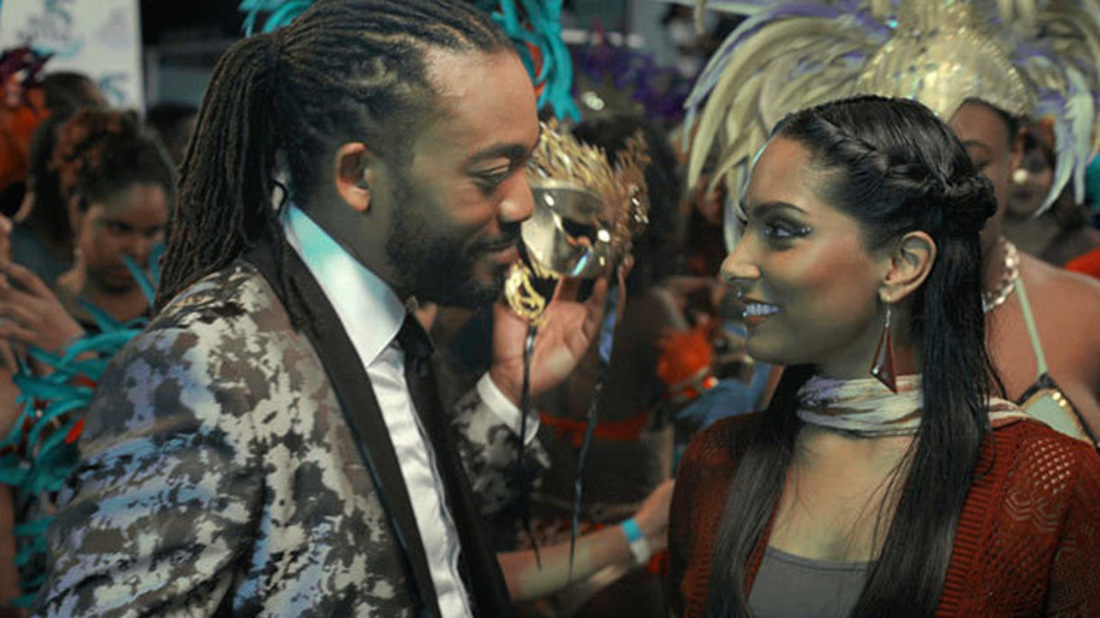|
DIRECTED BY | Todd Kessler FEATURING | The "King of Soca" Machel Montano in his feature film debut STARRING | Natalie Perera, Kabir Bedi, Valmike Rampersad, Rampersad, and Staz Nair PRODUCED BY | Ancil McKain, Claire Ince, Susanne Bohnet SCREENPLAY BY | Claire Ince RUN TIME | 101 minutes MPAA RATING | PG-13 NEW YORK (27 July 2016) - Serafini Releasing presents the U.S Premiere of BAZODEE a feature length film written by Claire Ince featuring the 'King of Soca' Machel Montano in his feature film debut to take place in New York City on Wednesday, 27 July 2016 at 7pm at the Playstation Theater Times Square followed by an after party with special live performances by Machel Montano and friends. Set on the vivid, colorful island of Trinidad & Tobago and pulsing with the sensuous dance rhythms of soca music, 'Bazodee' is a new style Bollywood musical with a distinctly Caribbean island flavor. it's Carnival week on the island of Trinidad & Tobago. Local musician Lee de Lean (Machel Montano) is in need of both luck and inspiration. Then he meets Anita (Natalie Perera), a beautiful Indian woman who is engaged to be married within days. With the excitement of Carnival coming, Lee and Anita find themselves caught in a whirlwind of music and passion where the greatest risk is falling in love. Opens nationwide on Friday, 5 August 2016. For more information visit Bazodee (http://bazodeethemovie.com FILM PREMIERE & MEDIA REQUESTS Interested media who wish to request attendance to the Film Premiere in New York City on Wednesday, 27 July 2016 at 7pm at the Playstation Theater Times Square and arrange interviews with screenwriter/producer Claire Ince and producer Ancil McKain, please contact WORKHOUSE, CEO Adam Nelson via [email protected] or telephone +1 212. 645. 8006 SUMMARY The meaning of Ba-zo-dee' (adj. Trinidadian slang) refers to a state of confusion; a state of love. Anita Ponchouri (Natalie Perera), the dutiful Indian daughter of a deep in debt businessman (Kabir Bedi) is about to marry a wealthy Londoner (Staz Nair) when a chance encounter with Soca singer, Lee de Leon (Soca music superstar Machel Montano in his film debut) sets things askew. In search of a muse, de Leon agrees to perform at the engagement party for both families. Unable to deny their mutual attraction, Anita must now choose between the answer to her family's financial prayers and the possibility of real love. Set on the vivid, colorful islands of Trinidad & Tobago and pulsing with the sensuous dance rhythms of Soca music, Bazodee is the new-style Bollywood musical with a distinctly Caribbean island flavor. BAZODEE: A CONVERSATION With Ancil McKain (Producer, Indiepelago Films), Claire Ince (Writer/Producer), Susanne Bohnet (Serafini Pictures and Releasing, Producer and Distributor) and Machel Montano (Actor) Q: How did the idea for Bazodee initially arise? Claire Ince: Well, it was 2006, around Carnival time in Trinidad and Tobago. The music that comes out of the Caribbean is dynamic and energetic, full of love and excitement. And Ancil and I thought it would be wonderful to make a musical that featured that music, with a love story at its heart. I had recently graduated from NYU, where I did my master's, and I wanted to make a story that was authentically Caribbean and featured that music. Q: What was the first step? Claire Ince: Crucial was making sure that we had the involvement of Machel [Montano, the Caribbean musician]. He was immediately hooked by the idea. Once he was on board, I decided I wanted to tell the story with a female protagonist. Trinidad and Tobago, where Ancil is from, has a blend of Indian and Afro-Caribbean cultures, so it seemed like it was a great setting to explore the conflict and possibility of a relationship between two people from different worlds. I wanted to tell a universal story of a daughter who is trying to do the right thing for her family, trying to live up to the obligations that she has, while also suddenly, for the first time, facing what her heart feels. She’s set to marry one man who will ease her family’s financial problems, but she falls for another, a musician, played by Machel. So you have her internal battle in terms of, do I pursue what my family obligations are, or do I follow my heart? Q: Machel, what led to your involvement? Machel Montano: Well, I met Claire and Ancil, and they were from the Caribbean, and they told me they were big fans of my music. The theme of my music is unity and love. They wanted to make a film utilizing my music, and they were interested in me playing a role. I was really impressed by the script. I was flattered they could write such a touching love story using the basis of my songs as inspiration. Q: What was it about the script that spoke to you, and resonated with your music? Machel Montano: Well, it really addressed the story of soca music and calypso music from Trinidad and Tobago. And I was attracted to my character, a Caribbean musician who chooses to leave Trinidad and go to London to try to succeed, and who comes back home and doesn’t want to perform again, but gets re-inspired by love, falling for the daughter of this local Indian family, even though she’s engaged to be married to someone else. It all resonated with me because in many ways, it’s my story too. I’ve gone many times to London to record, California too, but I've always returned home, and at home I’ve been re-inspired and rejuvenated and reconnected with my music on another level. The other really key part about the movie that touched me is that the taboo of love across races and classes and cultures is something you find in the mix in Trinidad and Tobago. And it’s such a cosmopolitan society, so I liked the idea of a film that addressed that. Q: Ancil, what was it about the project that spoke to you? Ancil McKain: Well, Claire and I are actually married, and we're both from the Caribbean. I’m from Trinidad and Tobago, Claire is from Barbados. The film is something that we've always wanted to do. So when Claire had this idea, I loved it. We've always loved Machel's music, and soca music in general. But Machel is the premiere Caribbean artist. Claire Ince: And that comes across in his performance in the film. Someone like Machel, who’s been performing for such a long time, they do know how to hold the stage, how to connect to audiences, and that is something you really want in a lead. It’s his first feature, but he definitely has those chops. He’s a natural actor. If you watch his face, you can see that he's a natural storyteller. So we were totally confident in his ability to transfer his charisma for stage to screen. Q: How did you go about casting your romantic lead opposite Machel, Anita, whom Machel’s character Lee falls for? Claire Ince: Natalie is a British-born, classically-trained actress who came to us through Kelly Valentine Hendry, who cast Slumdog Millionaire. So we did the big casting with Indian actors there, and Kelly was just totally blown away by Natalie. It's only her second role, so we feel like we're introducing her to a wider audience. She has such a screen presence that we were immediately drawn to her right away. Of course, it's a singing role as well, and she has that ability too. So she was a real find. I think the interesting thing about Natalie is that she has a warmth about her, and she also has a comedic quality too. Obviously Bazodee is a blend of comedy and drama, but for me, I think that was the thing with the character that wasa revelation was that she brought both warmth and comedy to the role. Q: Machel, you and Natalie have great chemistry together – how did you develop your dynamic with her during the shoot? Machel Montano: Working with Natalie was really amazing. What was interesting is that she had lost her dad a couple years before, and she was an aspiring actress who came to the movie business with the knowledge that her dad had been an actor, so it was really inspirational for her to connect with his memory through this story about a young woman trying to take care of her father – in this case, a woman worried about her father’s financial situation. Natalie’s connection to the story really inspired me, because there was also a connection between my life story and the music and the journey and the purpose of the film. It was great for each of us to be connecting with the other’s journey. Q: The film was directed by Todd Kessler. What was the process like of getting him on board, and what led you to feel confident in his ability to handle the material? Claire Ince: We did a wide search for directors, and we were really looking for someone who would preserve the authenticity of the material and who would bring the same enthusiasm to the project as Ancil and I. We had new talent like Natalie and Machel, so we wanted someone who would bring all of those elements together, and Todd Kessler came to the top of that list. I was familiar with Todd's work from before because I had actually worked with him shortly after I left NYU, and he had directed the independent film Keith with Jesse McCartney, and he was fresh off that in terms of the experience of getting the best out of a musician transitioning to acting, as well as having that ability to blend comedy and drama and music. Ancil McKain: When Todd read the script, I think he fell in love with the project. Claire Ince: One of the things I think that was important to him was to tell a story that was authentic and homegrown. I mean, one of the things we'd often talk about is how Hollywood sometimes discovers a location and tries to make a Hollywood story in that location that pays absolutely no respect to the actual authentic cultural experience of the environment. So for Todd, the idea that we were making this film with a Caribbean writer, a Caribbean producer, that attracted him to the project. Q: You mentioned that the film blends comedy and drama, and of course it also features musical sequences. What were some of the cinematic inspirations that spoke to you as you were making the film? Claire Ince: I think the film draws upon several things, which makes it a bit of its own creature. It does have sort of the classic Bollywood influences, but, we were also looking, for example, at a little indie movie like Once which also has that song element and that love story. As well as even something like Moulin Rouge which, you know, has that sort of performance, almost a Carnival-esque feel to it in the world of the Cancan and that kind of visual language. So I think there are several influences that create this unique sort of face in terms of the Bollywood and the Western and the Caribbean influences. Q: As you mentioned, the film blends different cinematic influences into a story that is distinctly Caribbean. What were you interested in exploring, thematically, with respect to the region itself? Ancil McKain: Well, Trinidad has a large percentage of people that came from India. That was back in the 1940s, and they came as indentured laborers to work on the sugar cane plantations. Then they stayed. So there is a very high percentage of Indians in Trinidad, so both cultures are in the mix. And that mix is manifested in the language, in the food, the dress the music, which is where, soca music actually came from. Claire Ince: That mix, that hybrid of cultures is part of the Caribbean. I think the film is quite optimistic. Obviously it's a musical, it belongs to that genre. And I feel like, in the Caribbean, there is generally an optimism to the environment. We wanted to make a musical that reflected that sense of cultural optimism. A lot of the indie films coming out that are set in the Caribbean, they present depressing views of drugs, murder, violence, that sort of fare. I feel like the Caribbean is also a place of warmth and music. Take a place like Trinidad and Tobago that invented steelpan, the instrument, out of that innovative sense of taking something and reusing it, reforming and refashioning it. For Caribbean people, that’s what we do. It's funny, the director and crew on this said they learned so many different ways of doing things from that Caribbean innovation, that even spilled over into the production of the film. So in terms of the spirit of the film, that’s what I really hope comes through. Q: Machel, can you expand on the connection between the Caribbean and soca music? Why is it a kind of music that only could have been born here? Machel Montano: Well, I feel that the Caribbean is a real paradise, it’s also viewed that way in the world, but at the same time, the truth is a lot of slaves were brought to the Caribbean from, for example, Africa. There were also indentured laborers who came from India. Then we had Chinese people come. We had Middle Eastern people come, Syrian, Caucasian. So we were this small chain of islands that had this rich mix of culture, mix of races, mix of traditions, not to mention the indigenous people we had here, like Caribs and Arawaks. There were also a lot of Spanish, a lot of French, Portuguese, Dutch. I think this melting pot is almost like a coral reef of all these different life forms. We have warm weather. We had beautiful beaches. What we have is a place built for love. Under these conditions, things like calypso came out of the slavery, and things like Carnival, which grew out of the fact that we had slavery here. But over time we have learned how to live side by side, how to live together, how to really embrace each other. Soca music is the soundtrack of our biggest festival, Carnival, which is celebrated across Trinidad, and which is about people celebrating together, living together. So soca music represents, ultimately, that unity. It's the soundtrack of putting people in the streets and help them to express themselves and sing and it’s about many colors and many styles. It's about, ultimately, the joy of freedom and the joy of expression. Q: How did you personally connect to Soca? Machel Montano: Well, I started in calypso, which is the music of our country and the music of our time. It was about speaking about the issues of the day and the issues of the community. It went way back to the days of slavery. However, soca music was introduced to me at a young age and I found that soca was the soul of calypso, an advanced infusion of calypso. It was a happy music, you know, a spiritual music, music to make people jump and dance and sing. Generally a celebratory music. It really had this essence of energy and the energy that it carried was an energy of togetherness and energy of unity and an energy of love, ultimately. So I latched onto this music and I decided, when I started singing soca, that I wanted to see the young people involved, and there weren’t many young people involved in soca music. A lot of them were into reggae and pop and dance music. So for me, early in my life, my journey became to get young people to love soca and to revolutionize soca music, to change it, and to inspire others to continue on with it, to take it to the corners of the globe. So that has been my journey. To get into a film like this, the opportunity to put my music in a film was another way to communicate to the corners of the globe, to talk to people, to share the excitement and the joy and the love and the energy of soca music with the rest of the world. Q: Susanne, how did you become involved in the project? Susanne Bohnet: I was working in Trinidad for a very long time, almost 20 years. And I was invited to be a speaker at a symposium during the Caribbean Film Festival in 2015. Bazodee had a private screening during the festival, and once I saw the film, I had this vision that this could be the first film for me to launch my new company, which is a distribution company. Bazodee is a very sexy, artistic film, and I was able to come in and add to the film and add to the soundtrack, just polish it in certain aspects even more than the film had originally been. We felt really confident about the film, that it’s not a small-platform release. The film is a very emotional experience, and it taps into a very unique point of view. I think it's a very universal film. It speaks to subject matters which are very relevant, racial matters and cultural matters. Bazodee approaches that subject of race and class in a very personal story. There's always this moment in one individual's life where you have to make a decision to step into your own power or to go with the status quo, where you have to decide about how you are conditioned to behave and how you are conditioned to live your life. Yet it's not a lecturing film and it would never want to be a lecturing film. It's a very sexy, feel-good musical. It’s about that which unites us, about what happens if you jump over those cultural boundaries and have two cultures from different backgrounds come together. The outcome is more beautiful than what you probably think.nSo Bazodee is such a celebration of life and I think audiences will just respond incredibly well seeing a film like this. And I have to hope that it sets a precedent of its own. It's a musical which crosses over Caribbean music, electronic music, Indian influences. Machel is remarkable and a huge star in his own world. I just have to believe that audiences will be blown away.
0 Comments
Leave a Reply. |
WORKHOUSE
THE HOUSE THAT WORK BUILT. Archives
July 2024
|






 RSS Feed
RSS Feed